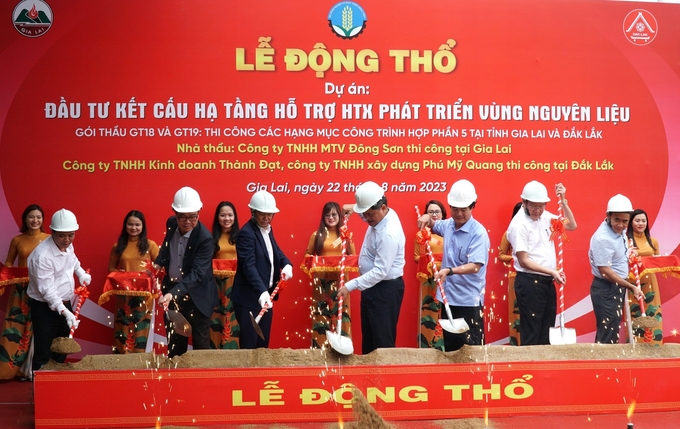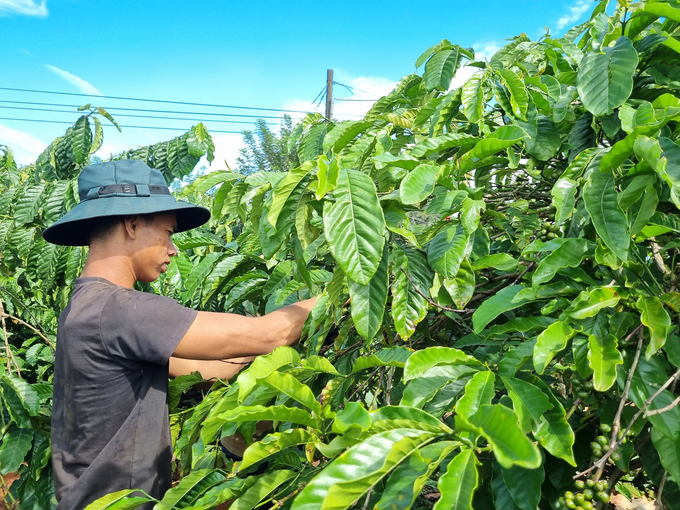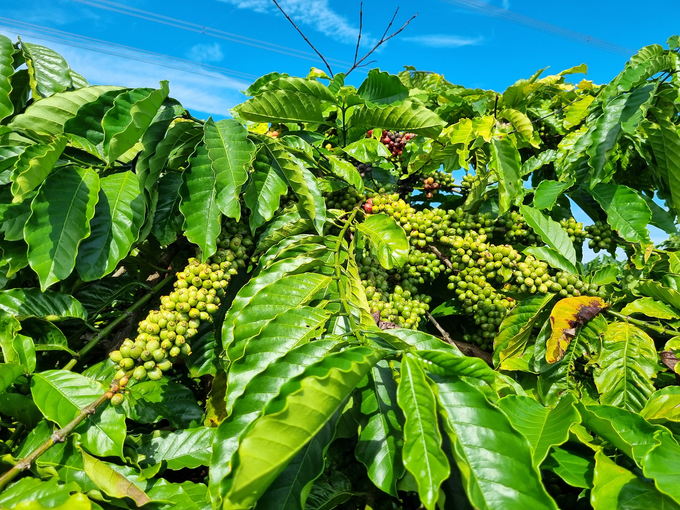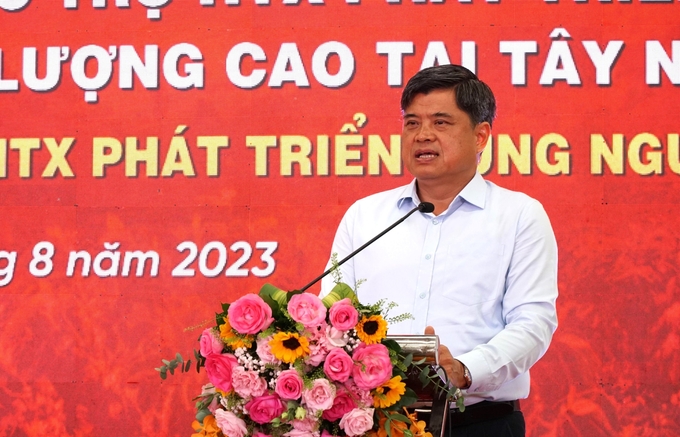May 20, 2025 | 17:38 GMT +7
May 20, 2025 | 17:38 GMT +7
Hotline: 0913.378.918
May 20, 2025 | 17:38 GMT +7
Hotline: 0913.378.918

The inauguration ceremony marks the commencement of the implementation of Phase 5 of the project "Infrastructure Investment to Support Cooperatives in Developing High-Quality Coffee Material Regions in the Central Highlands" in the Tay Nguyen region. Photo: Tuan Anh.
On August 22nd, in Gia Lai province, the Ministry of Agriculture and Rural Development (MARD) organized the launching ceremony for the implementation of Phase 5 of the project "Infrastructure Investment to Support Cooperatives in Developing High-Quality Coffee Material Regions in the Central Highlands." This project is part of the larger "Infrastructure Investment to Support Cooperatives in Developing Coffee Material Regions" project, with a total investment of about 80 billion VND.
The project "Infrastructure Investment to Support Cooperatives in Developing High-Quality Coffee Material Regions in the Central Highlands" in the Tay Nguyen region is assigned by MARD to the Project Management Board of Agriculture Projects as the investor.
The project's objective is to establish a concentrated, modern, and technologically advanced coffee material production region based on sustainable linkages between cooperatives and processing-export enterprises. It aims to enhance and improve the role and efficiency of agricultural cooperatives in the value chain of high-quality coffee, reduce product costs, increase income, and contribute to improving the livelihoods of local residents.
Furthermore, connecting transportation infrastructure to coffee production areas of localities and cooperatives will help reduce production costs, stimulate the development of agricultural cooperatives, and act as a bridge linking people and businesses in consuming high-quality coffee products.

The Central Highlands is the coffee capital of the country. Photo: Tuan Anh.
Mr. Le Van Hien, Head of the Management Board of Agricultural Projects (Ministry of Agriculture and Rural Development), stated that this is a project built upon the successful results of the VnSAT project in supporting cooperatives to achieve sustainable replanting and create a region of high-quality coffee material connectivity.
"The key objective is to continue investing in core cooperatives to establish a solid foundation for a high-quality coffee material region. After nearly 2 years of preparation for investment, the project is now ready for implementation," Mr. Hien said.
Also according to Mr. Hien, although the investment capital for the project is not significant, it holds great significance in the execution of the pilot program for coffee material region development.
The Management Board of Agricultural Projects and the executing unit pledge to strive for the completion of the road system in 2023 and the full implementation of Phase 5 in the first quarter of 2024.

Raising the quality of coffee is the top priority for Gia Lai province. Photo: Tuan Anh.
Gia Lai province is a major coffee-growing region in the country with an area of over 98,000 hectares. Currently, the province has around 46,000 hectares of coffee production following standards such as VietGAP, 4C, Organic, and Rain Forest.
Mr. Luu Trung Nghia, Director of the Department of Agriculture and Rural Development of Gia Lai province, said: "We appreciate the enthusiastic support and attention from the Ministry of Agriculture and Rural Development in investing in road infrastructure to serve coffee production and constructing warehouse facilities for cooperatives."
"In the coming time, Gia Lai province hopes to receive the support of the Ministry of Agriculture and Rural Development to continue implementing the remaining projects, such as the Silo system phase 2 and the investment in building a provincial coffee logistics center. Additionally, organizing production and managing the coffee material region, promoting community-based agriculture, and communication," Mr. Nghia shared.
The project "Investment in infrastructure to support cooperatives in developing high-quality coffee material regions in the Central Highlands" starts from a relatively favorable position with the collaboration of state management agencies and the authorities of Gia Lai and Dak Lak provinces. Besides, the project also receives the support of cooperatives and businesses participating in the value chain.
Mr. Lam Quoc Trieu, Director of the Agricultural, Trade and Ecotourism Services Cooperative Ham Rong, stated that the investment by the Ministry of Agriculture and Rural Development in upgrading the transportation route is beneficial for sustainable coffee cultivation and care. Moreover, it facilitates processing, harvesting, and applying technical expertise to increase productivity.
"In order to synchronize the coffee material region's infrastructure, we hope the Ministry of Agriculture and Rural Development will consider and approve the coffee chain logistics project soon," Mr. Trieu recommended.
Mr. Thai Nhu Hiep, Director of Vinh Hiep Company Limited, noted that in the Central Highlands, infrastructure plays a crucial role for cooperatives to develop production and enhance business efficiency. The investment and construction of this project is the hope of many farmers and the aspiration to elevate the high-quality coffee material region to a global scale.

Deputy Minister Tran Thanh Nam gave directions at the Launching Ceremony of Phase 5 Implementation. Photo: Tuan Anh.
Deputy Minister of Agriculture and Rural Development Tran Thanh Nam stated that Vietnam is one of the leading coffee exporting countries, with an export value of 2.7 billion USD from the beginning of the year until now. Currently, Vietnam has also become a destination for many large corporations engaged in coffee production. Therefore, the Ministry of Agriculture and Rural Development has identified the need to establish standardized coffee material regions in key areas to meet domestic and export consumption requirements.
For the Central Highlands provinces, the Ministry of Agriculture and Rural Development is implementing a project to build standardized coffee material regions covering an area of 19,700 hectares, including the provinces of Gia Lai, Dak Lak, Kon Tum, and Dak Nong. Within this project area, about 64 cooperatives will benefit, involving 5,230 households engaged in coffee production.
Infrastructure is just one part; the most important aspect is to reorganize production in various regions to enhance the quality, value, and brand of Vietnamese coffee.
"The main task of the project is to build standardized material regions according to international standards, with a special focus on reducing coffee emissions. For this purpose, the Ministry of Agriculture and Rural Development has entrusted the National Extension Center to coordinate with localities in establishing community-based extension teams to support coffee producers in meeting standards and regulations," emphasized the Deputy Minister.
The Deputy Minister also noted that currently, in agricultural production, the issue of linking production among households, cooperatives, and businesses is the most important. However, this issue is still weak and faces certain limitations. Therefore, in addition to building material regions, the Ministry of Agriculture and Rural Development also aims to establish a coffee value chain involving farmers, cooperatives, production, and processing enterprises.
Deputy Minister Tran Thanh Nam affirmed that besides the two issues of building standardized material regions and value chains for coffee, it is essential to enhance the capacity of cooperatives through training programs covering production plans, production methods, and accounting support. Furthermore, digital transformation training for cooperatives, particularly in product traceability, is also needed.
Translated by Nguyen Hai Long

(VAN) Japan's grant aid project contributes to capacity building, promoting organic agricultural production, and fostering sustainable community development in Dong Thap province.

(VAN) For years, the CRISPR-Cas9 genome technology has been reshaping genetic engineering, a precision tool to transform everything from agriculture to medicine.

(VAN) Vietnam aims to become a 'leader' in the region in the capacity and managing effectively soil health and crop nutrition.
![Reducing emissions from rice fields: [Part 1] Farming clean rice together](https://t.ex-cdn.com/nongnghiepmoitruong.vn/608w/files/news/2025/05/05/z6509661417740_a647202949c539012a959e841c03e1d3-nongnghiep-143611.jpg)
(VAN) Growing clean rice helps reduce environmental pollution while increasing income, allowing farmers to feel secure in production and remain committed to their fields for the long term.
/2025/05/19/5136-1-144800_230.jpg)
(VAN) The Nghe An Provincial People's Committee has just approved the list of beneficiaries eligible for revenue from the Emission Reductions Payment Agreement (ERPA) in the North Central region for the year 2025.

(VAN) 14 out of 35 domesticated elephants in Dak Lak province have had their living conditions improved, with 11 of them currently participating in the non-riding elephant tourism model.

(VAN) Muong Nhe Nature Reserve hopes that being upgraded to a national park will lay the foundation for forest protection efforts to be carried out in a systematic, modern, and sustainable manner.